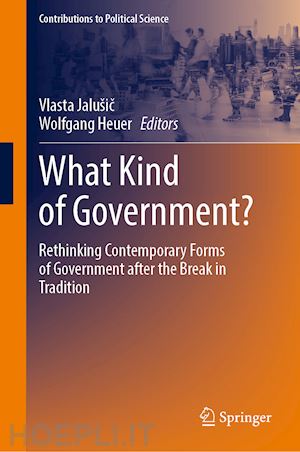
Questo prodotto usufruisce delle SPEDIZIONI GRATIS
selezionando l'opzione Corriere Veloce in fase di ordine.
Pagabile anche con Carta della cultura giovani e del merito, 18App Bonus Cultura e Carta del Docente
This book seeks to develop an understanding of the changes in contemporary forms of government and explores the nature and structure of the various corrupt, undemocratic, oppressive, and abusive governments that continue to emerge around the globe. While proceeding from Hannah Arendt’s well-known thesis of the “break in (political) tradition” that occurred with the totalitarianisms of the 20th century, it addresses some main conceptual frameworks and a number of key trends in existing forms of government and their relations to historical forms.
The primary intended audience includes educators, scholars, and researchers with an interest in contemporary democracy and anti-democratic movements, government, questions of power, political theory / philosophy, and conceptual history, as well as and students enrolled in various disciplines of the social sciences. Moreover, it will be of interest to Arendt scholars and those researching the contemporary challenges to democracy and constitutional rule worldwide.
Chapters 1, 4, 6 and 13 are available open access under a Creative Commons Attribution 4.0 International License via link.springer.com.
Chapter 1. Thinking Contemporary Forms of Government after the Broken Tradition.- Part I: Between Past and Present.- Chapter 2. An Unholy Trinity – Populism, Illiberalism, Authoritarianism.- Chapter 3. Bonapartism: Obsolescence of the “Forms of Government”.- Chapter 4. Illiberal Democracy as Revolutionary Action: The Case of the 2020–2022 Janša Government in Slovenia.- Chapter 5. Neither Ruling nor Being Ruled.- Chapter 6. The Politics of Crisis and Contemporary Forms of Government.- Chapter 7. Bureaucracy as a Pervasive Phenomenon of Contemporary Governments.- Chapter 8. Understanding Political Change with Montesquieu.- Part II: New Beginnings.- Chapter 9. Revitalizing Democracy: Citizen Assemblies, Citizen Power, and Spaces of Freedom.- Chapter 10. Federalism and Deconstruction in Hannah Arendt.- Chapter 11. In the Face of Global Upheavals –Re-sharpening the Dimensions of Plurality in Arendt’s Republican Thinking.- Chapter 12. Taking Care of the Eternal: Politics between Two Homes.- Chapter 13. Courage against Domination in Republican Democracy.
Dr. Vlasta Jalušic is a senior researcher, one of the founders of the Peace Institute – Institute for Contemporary Social and Political Studies, and a Full Professor at the University of Ljubljana (Slovenia).
Dr. Wolfgang Heuer is a senior researcher at the Otto Suhr Institute of Political Science, Freie Universität Berlin (Germany), and managing editor of “HannahArendt.net, Journal for Political Thinking”.











Il sito utilizza cookie ed altri strumenti di tracciamento che raccolgono informazioni dal dispositivo dell’utente. Oltre ai cookie tecnici ed analitici aggregati, strettamente necessari per il funzionamento di questo sito web, previo consenso dell’utente possono essere installati cookie di profilazione e marketing e cookie dei social media. Cliccando su “Accetto tutti i cookie” saranno attivate tutte le categorie di cookie. Per accettare solo deterninate categorie di cookie, cliccare invece su “Impostazioni cookie”. Chiudendo il banner o continuando a navigare saranno installati solo cookie tecnici. Per maggiori dettagli, consultare la Cookie Policy.